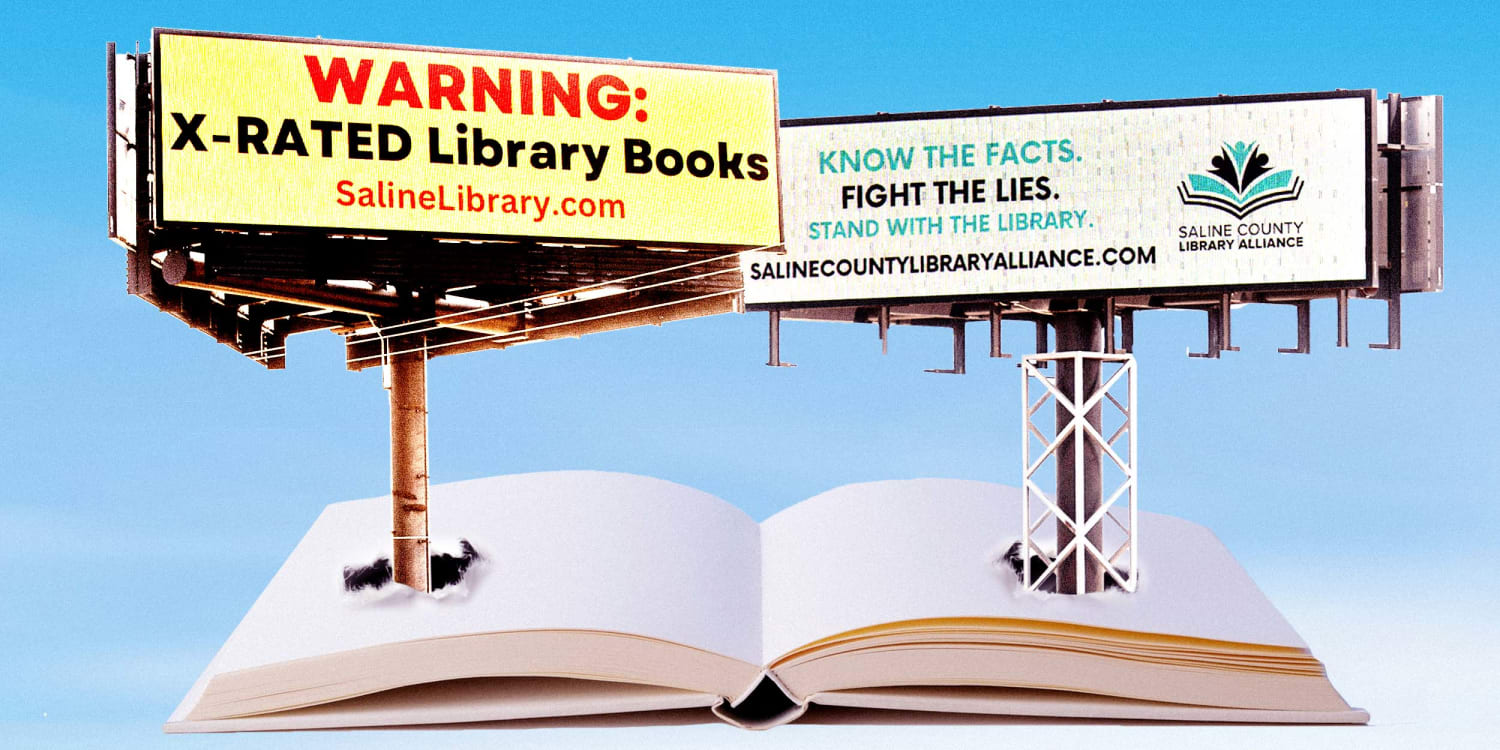A group of public libraries and book publishers in Arkansas is pushing back against a growing movement to restrict what children are allowed to read.
Arkansas is one of four states that recently passed laws that make it easier to prosecute librarians over sexually explicit books, a designation conservatives often use to target books with descriptions of gender identity and sexuality. On Friday, a coalition led by the Central Arkansas Library System, based in Little Rock, filed a federal lawsuit it hopes will set a precedent about the constitutionality of such laws.
The Central Arkansas Library System argued in a filing in U.S. District Court for the Western District of Arkansas that Act 372 violates the First Amendment by making it a misdemeanor for libraries to give children access to materials that are “harmful to minors.” The term — which means any depiction of nudity or sexual conduct meant to appeal to a prurient interest that lacks serious artistic, medical or political value and which contemporary community standards would find inappropriate for minors — is too broad, the suit contends. For example, the law would prohibit 17-year-olds from viewing materials deemed too explicit for 7-year-olds.
The complaint also alleges that the law violates residents’ due process rights by allowing local elected officials to overrule librarians’ decisions about book challenges without providing explanations or permitting appeals from those who disagree.

“There’s enormous angst and anxiety on the part of librarians in the state,” said Nate Coulter, the executive director of the Central Arkansas Library System, which has 17 branches in seven cities. “Because not only do they feel like people in the state government don’t respect their integrity, but they’re seen as a hostile party. They’ve been called groomers. They’ve been accused of being pedophiles. They’re basically targeted by a very divisive, angry group of people who are vocal about believing that somehow the library is the problem in our community.”
It’s unclear how prosecutors or judges would handle such criminal cases, but violations of Act 372’s “harmful to minors” provision could result in maximum jail sentences of one year. The law also eliminates protections for librarians and teachers who distribute material “that is claimed to be obscene” as part of their job, a felony punishable by up to six years in prison; the lawsuit isn’t challenging that part of the law.
Dan Sullivan, the Republican state senator who sponsored the measure, defended the possibility that a librarian could go to prison over children’s books.
“We don’t exempt doctors from abuse laws. We don’t exempt pharmacists from drug laws,” Sullivan said. “And I don’t know why we would exempt librarians from these laws about what’s harmful to children.”
Book ban battles make an impact
Although the law doesn’t go into effect until Aug. 1, the lawsuit says Act 372 is already having an effect in Crawford County, where public libraries recently moved books about disabled people, puberty, religion and LGBTQ characters out of the children’s sections. When residents asked for the books to be moved back, Crawford County’s attorney defended the move and cited Act 372, according to a letter obtained by NBC News.
The suit asks that a federal judge block prosecutors from enforcing Act 372’s provisions regarding book challenges and materials “harmful to minors.” It names the Crawford County government, Crawford County Judge, or CEO, Chris Keith and 28 prosecutors across the state in their official capacities as defendants. Crawford County and Keith did not immediately respond to requests for comment.
Arkansas libraries are entering a nationwide maelstrom over children’s access to materials that include descriptions of sexuality and LGBTQ characters or themes. In the past two years, conflicts over restrictions on books have expanded from school and classroom libraries to public community libraries. As with school boards, library trustees meetings in many cities have turned from sleepy affairs to impassioned political battlegrounds, leading to heated rhetoric and legislation targeting librarians.
This year, 15 states considered bills that would open public librarians up to criminal charges for letting minors check out certain books, according to the EveryLibrary Institute, a librarian advocacy group. The governors of Arkansas, Indiana and Montana signed bills into law, while in Idaho and North Dakota, similar measures passed but were vetoed by Republican governors. Last year, Oklahoma was the first state to pass a law removing librarians’ protection from prosecution.
As the battles unfold locally, librarians have become targets of those who believe children shouldn’t have access to books with frank descriptions of sexuality, discussion of gender transitions or celebration of LGBTQ identity.
In Moon Township, Pennsylvania, local elected officials — who’d objected to children’s books about drag queens — questioned a public library about its Disability Pride Month display, because they thought the use of the word “pride” was a reference to LGBTQ people.
In Post Falls, Idaho, a library board called police to a meeting in February to address a rowdy crowd that kept shouting “shame” and “Satan” at people who defended keeping LGBTQ-themed books available for children.
In Llano, Texas, county officials nearly shut down its library system this year over a dispute about whether to keep books like “Larry the Farting Leprechaun” and “I Need a New Butt!” on the shelf because residents complained the illustrations appealed to pedophiles.
Clare Graham, the director of the Malvern-Hot Spring County Library in central Arkansas, has been watching in disbelief as such arguments roil communities in the state and beyond.

“The messaging is saying, ‘If you are against this, you want kids to see porn,’ and that’s wrong, but that’s the way it’s been framed,” Graham said. “It leaves me scratching my head, because we are a sanctuary for many, and we are a neutral space.”
In Saline County, in central Arkansas, dueling billboards show the divisions over public libraries.
Billboards sponsored by the Saline County Republican Women and the Saline County Republican Committee warn of “X-RATED LIBRARY BOOKS” and direct people to a website that primarily highlights books that include LGBTQ characters. One example is a children’s book published by HBO’s “Last Week Tonight with John Oliver” about a gay bunny named after former Vice President Mike Pence’s pet rabbit, which the website says is inappropriate for children and part of the library’s effort to “draw them away from Christian values.”
In response, the Saline County Library Alliance, a group of residents opposed to book restrictions, put up a billboard urging residents to “FIGHT THE LIES. STAND WITH THE LIBRARY.” Bailey Morgan, who raised money for the billboards, said they fear the campaign against supposed explicit books will lead to funding cuts for the library, as has happened elsewhere in the state.
Source: | This article originally belongs to Nbcnews.com









